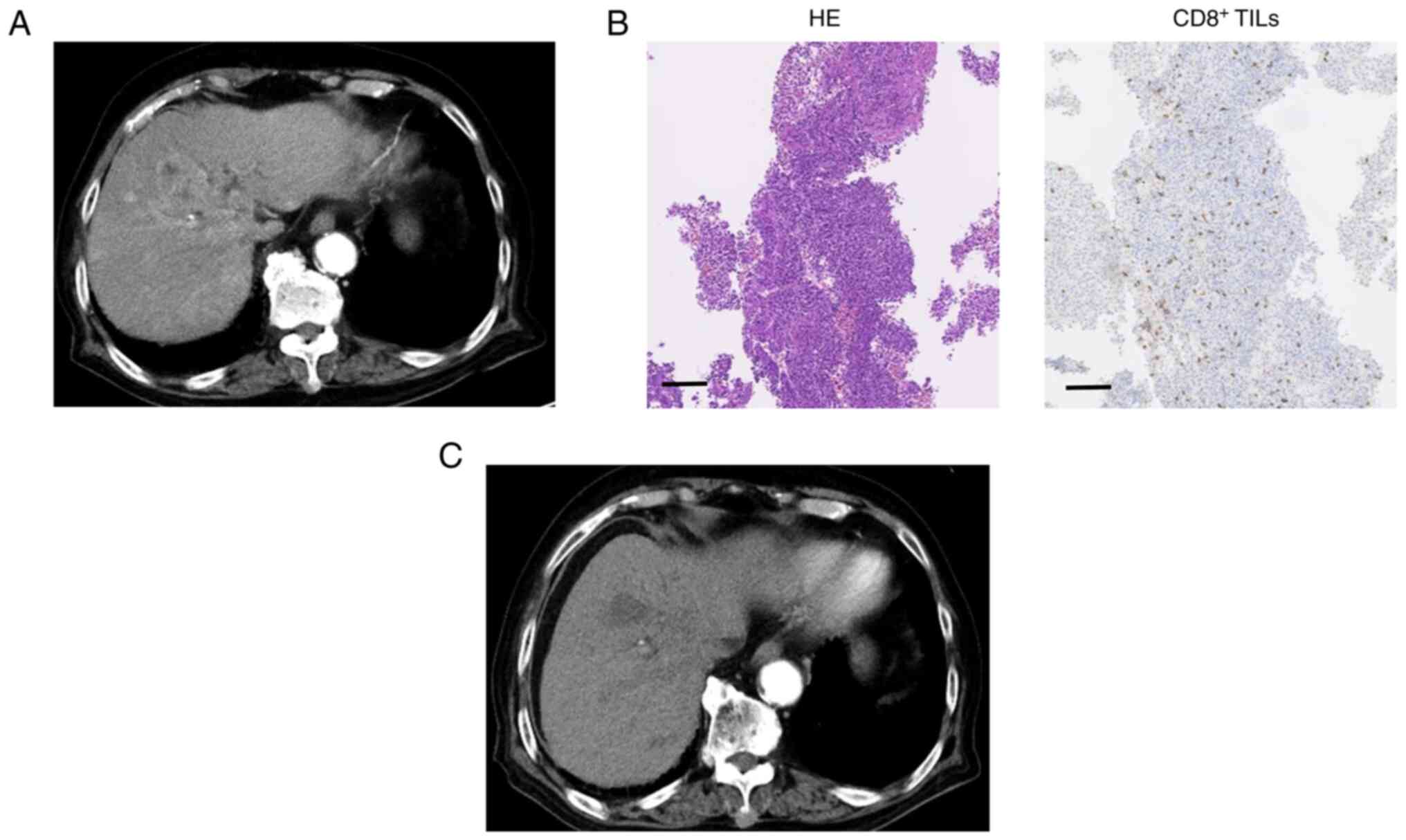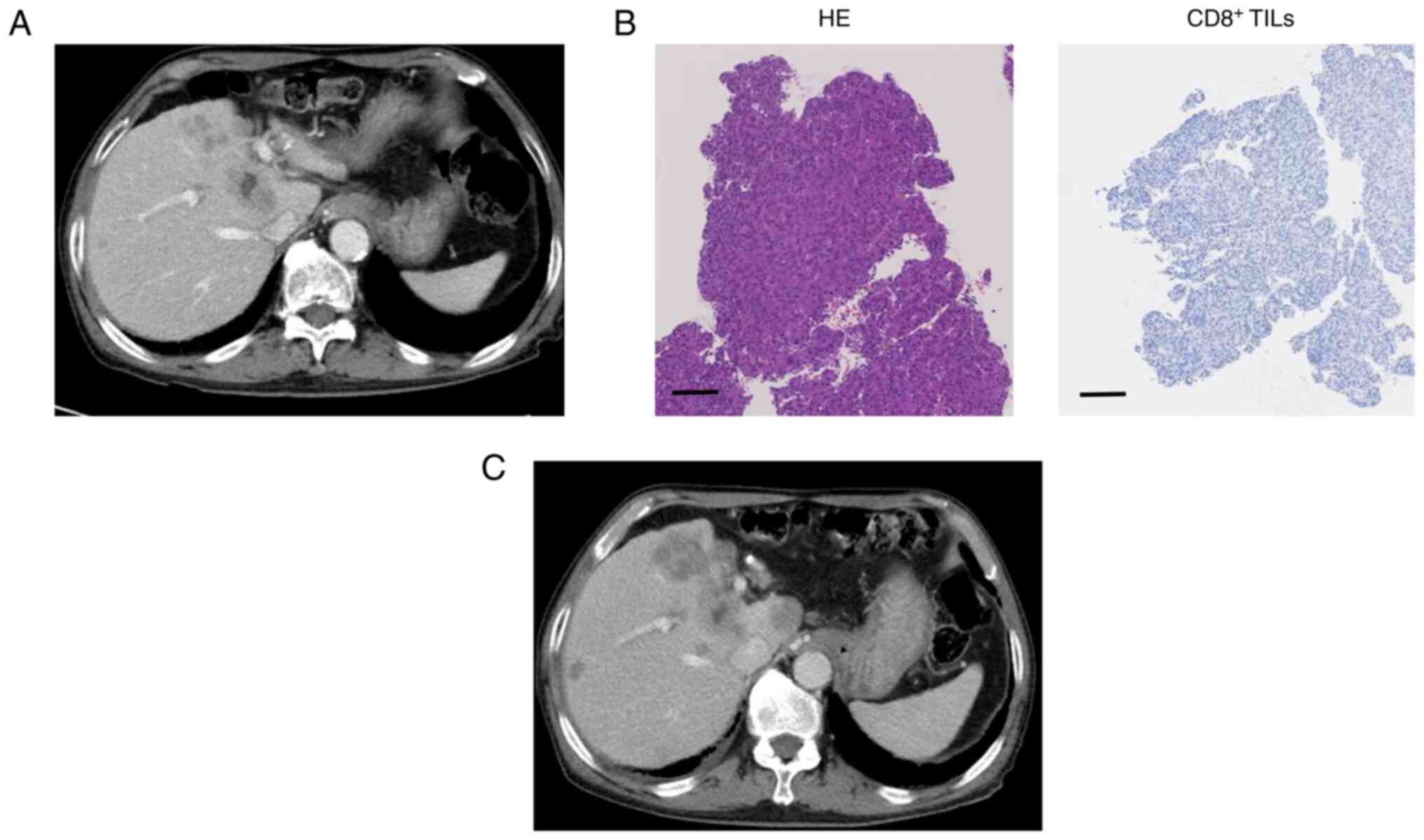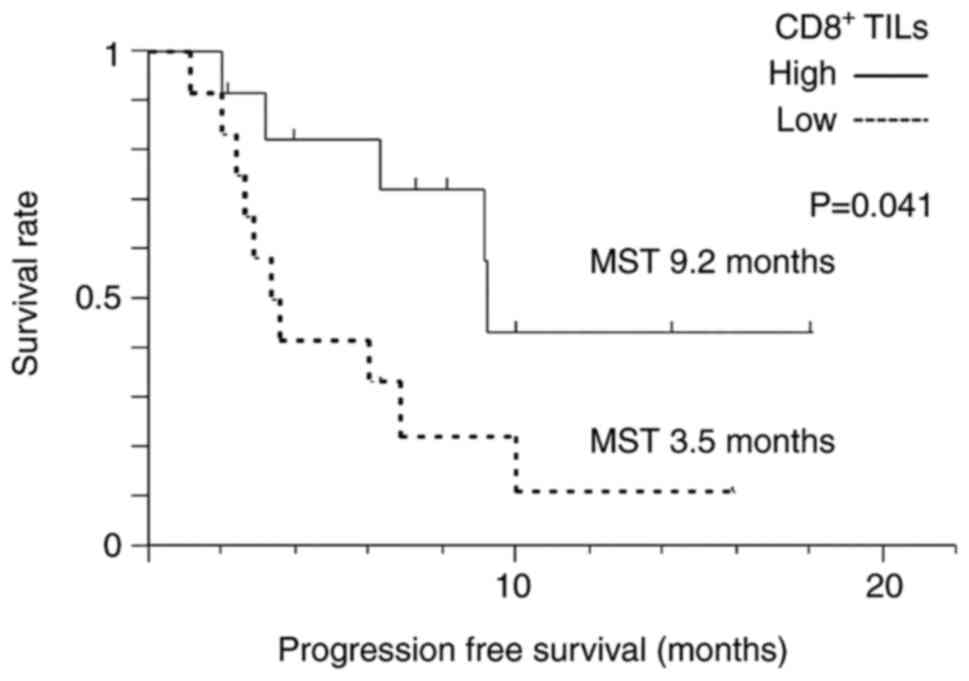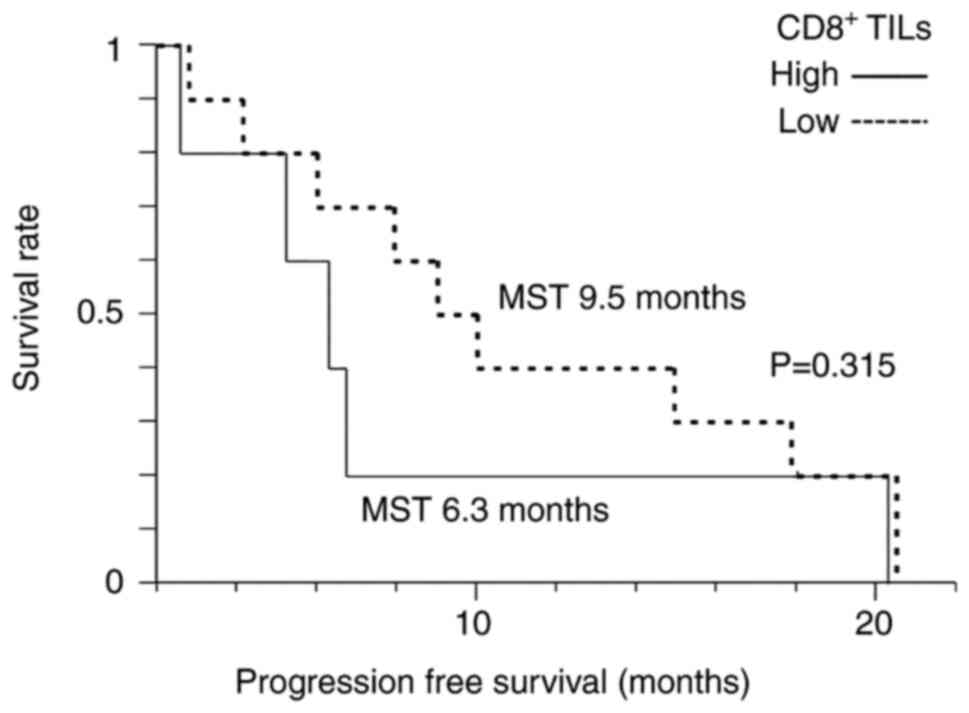|
1
|
Caldwell S and Park SH: The epidemiology
of hepatocellular cancer: From the perspectives of public health
problem to tumor biology. J Gastroenterol. 44:96–101. 2009.
View Article : Google Scholar : PubMed/NCBI
|
|
2
|
Sung H, Ferlay J, Siegel RL, Laversanne M,
Soerjomataram I, Jemal A and Bray F: Global Cancer Statistics 2020:
GLOBOCAN estimates of incidence and mortality worldwide for 36
cancers in 185 countries. CA Cancer J Clin. 71:209–249. 2021.
View Article : Google Scholar : PubMed/NCBI
|
|
3
|
Finn RS, Qin S, Ikeda M, Galle PR, Ducreux
M, Kim TY, Kudo M, Breder V, Merle P, Kaseb AO, et al: Atezolizumab
plus bevacizumab in unresectable hepatocellular carcinoma. N Engl J
Med. 382:1894–1905. 2020. View Article : Google Scholar : PubMed/NCBI
|
|
4
|
Kudo M, Finn RS, Qin S, Han KH, Ikeda K,
Piscaglia F, Baron A, Park JW, Han G, Jassem J, et al: Lenvatinib
versus sorafenib in first-line treatment of patients with
unresectable hepatocellular carcinoma: A randomised phase 3
non-inferiority trial. Lancet. 391:1163–1173. 2018. View Article : Google Scholar : PubMed/NCBI
|
|
5
|
El-Khoueiry AB, Sangro B, Yau T, Crocenzi
TS, Kudo M, Hsu C, Kim TY, Choo SP, Trojan J, Welling TH Rd, et al:
Nivolumab in patients with advanced hepatocellular carcinoma
(CheckMate 040): An open-label, non-comparative, phase 1/2 dose
escalation and expansion trial. Lancet. 389:2492–2502. 2017.
View Article : Google Scholar : PubMed/NCBI
|
|
6
|
Zhu AX, Finn RS, Edeline J, Cattan S,
Ogasawara S, Palmer D, Verslype C, Zagonel V, Fartoux L, Vogel A,
et al: Pembrolizumab in patients with advanced hepatocellular
carcinoma previously treated with sorafenib (KEYNOTE-224): A
non-randomised, open-label phase 2 trial. Lancet Oncol. 19:940–952.
2018. View Article : Google Scholar : PubMed/NCBI
|
|
7
|
Eso Y and Marusawa H: Novel approaches for
molecular targeted therapy against hepatocellular carcinoma.
Hepatol Res. 48:597–607. 2018. View Article : Google Scholar : PubMed/NCBI
|
|
8
|
Tohyama O, Matsui J, Kodama K, Hata-Sugi
N, Kimura T, Okamoto K, Minoshima Y, Iwata M and Funahashi Y:
Antitumor activity of lenvatinib (e7080): An angiogenesis inhibitor
that targets multiple receptor tyrosine kinases in preclinical
human thyroid cancer models. J Thyroid Res. 2014:6387472014.
View Article : Google Scholar : PubMed/NCBI
|
|
9
|
Yamamoto Y, Matsui J, Matsushima T,
Obaishi H, Miyazaki K, Nakamura K, Tohyama O, Semba T, Yamaguchi A,
Hoshi SS, et al: Lenvatinib, an angiogenesis inhibitor targeting
VEGFR/FGFR, shows broad antitumor activity in human tumor xenograft
models associated with microvessel density and pericyte coverage.
Vasc Cell. 6:182014. View Article : Google Scholar : PubMed/NCBI
|
|
10
|
Hurkmans DP, Kuipers ME, Smit J, van
Marion R, Mathijssen RHJ, Postmus PE, Hiemstra PS, Aerts JGJV, von
der Thüsen JH and van der Burg SH: Tumor mutational load, CD8+ T
cells, expression of PD-L1 and HLA class I to guide immunotherapy
decisions in NSCLC patients. Cancer Immunol Immunother. 69:771–777.
2020. View Article : Google Scholar : PubMed/NCBI
|
|
11
|
Li F, Li C, Cai X, Xie Z, Zhou L, Cheng B,
Zhong R, Xiong S, Li J, Chen Z, et al: The association between
CD8+ tumor-infiltrating lymphocytes and the clinical
outcome of cancer immunotherapy: A systematic review and
meta-analysis. EClinicalMedicine. 41:1011342021. View Article : Google Scholar : PubMed/NCBI
|
|
12
|
Rimini M, Rimassa L, Ueshima K, Burgio V,
Shigeo S, Tada T, Suda G, Yoo C, Cheon J, Pinato DJ, et al:
Atezolizumab plus bevacizumab versus lenvatinib or sorafenib in
non-viral unresectable hepatocellular carcinoma: An international
propensity score matching analysis. ESMO Open. 7:1005912022.
View Article : Google Scholar : PubMed/NCBI
|
|
13
|
Zhu AX, Abbas AR, de Galarreta MR, Guan Y,
Lu S, Koeppen H, Zhang W, Hsu CH, He AR, Ryoo BY, et al: Molecular
correlates of clinical response and resistance to atezolizumab in
combination with bevacizumab in advanced hepatocellular carcinoma.
Nat Med. 28:1599–1611. 2022. View Article : Google Scholar : PubMed/NCBI
|
|
14
|
Johnson PJ, Berhane S, Kagebayashi C,
Satomura S, Teng M, Reeves HL, O'Beirne J, Fox R, Skowronska A,
Palmer D, et al: Assessment of liver function in patients with
hepatocellular carcinoma: A new evidence-based approach-the ALBI
grade. J Clin Oncol. 33:550–558. 2015. View Article : Google Scholar : PubMed/NCBI
|
|
15
|
Lencioni R and Llovet JM: Modified RECIST
(mRECIST) assessment for hepatocellular carcinoma. Semin Liver Dis.
30:52–60. 2010. View Article : Google Scholar : PubMed/NCBI
|
|
16
|
Montironi C, Castet F, Haber PK, Pinyol R,
Torres-Martin M, Torrens L, Mesropian A, Wang H, Puigvehi M, Maeda
M, et al: Inflamed and non-inflamed classes of HCC: A revised
immunogenomic classification. Gut. 72:129–140. 2022. View Article : Google Scholar : PubMed/NCBI
|
|
17
|
Sangro B, Melero I, Wadhawan S, Finn RS,
Abou-Alfa GK, Cheng AL, Yau T, Furuse J, Park JW, Boyd Z, et al:
Association of inflammatory biomarkers with clinical outcomes in
nivolumab-treated patients with advanced hepatocellular carcinoma.
J Hepatol. 73:1460–1469. 2020. View Article : Google Scholar : PubMed/NCBI
|
|
18
|
Pinyol R, Sia D and Llovet JM: Immune
Exclusion-Wnt/CTNNB1 class predicts resistance to immunotherapies
in HCC. Clin Cancer Res. 25:2021–2023. 2019. View Article : Google Scholar : PubMed/NCBI
|
|
19
|
Harding JJ, Nandakumar S, Armenia J,
Khalil DN, Albano M, Ly M, Shia J, Hechtman JF, Kundra R, El Dika
I, et al: Prospective genotyping of hepatocellular carcinoma:
Clinical implications of next-generation sequencing for matching
patients to targeted and immune therapies. Clin Cancer Res.
25:2116–2126. 2019. View Article : Google Scholar : PubMed/NCBI
|
|
20
|
Chen L, Zhou Q, Liu J and Zhang W: CTNNB1
alternation is a potential biomarker for immunotherapy prognosis in
patients with hepatocellular carcinoma. Front Immunol.
12:7595652021. View Article : Google Scholar : PubMed/NCBI
|
|
21
|
Bai R, Lv Z, Xu D and Cui J: Predictive
biomarkers for cancer immunotherapy with immune checkpoint
inhibitors. Biomarker Res. 8:342020. View Article : Google Scholar : PubMed/NCBI
|
|
22
|
Hellmann MD, Ciuleanu TE, Pluzanski A, Lee
JS, Otterson GA, Audigier-Valette C, Minenza E, Linardou H, Burgers
S, Salman P, et al: Nivolumab plus Ipilimumab in lung cancer with a
high tumor mutational burden. N Engl J Med. 378:2093–2104. 2018.
View Article : Google Scholar : PubMed/NCBI
|
|
23
|
Rosenberg JE, Hoffman-Censits J, Powles T,
van der Heijden MS, Balar AV, Necchi A, Dawson N, O'Donnell PH,
Balmanoukian A, Loriot Y, et al: Atezolizumab in patients with
locally advanced and metastatic urothelial carcinoma who have
progressed following treatment with platinum-based chemotherapy: A
single-arm, multicentre, phase 2 trial. Lancet. 387:1909–1920.
2016. View Article : Google Scholar : PubMed/NCBI
|
|
24
|
Gibney GT, Weiner LM and Atkins MB:
Predictive biomarkers for checkpoint inhibitor-based immunotherapy.
Lancet Oncol. 17:e542–e551. 2016. View Article : Google Scholar : PubMed/NCBI
|
|
25
|
Cristescu R, Mogg R, Ayers M, Albright A,
Murphy E, Yearley J, Sher X, Liu XQ, Lu H, Nebozhyn M, et al:
Pan-tumor genomic biomarkers for PD-1 checkpoint blockade-based
immunotherapy. Science. 362:eaar35932018. View Article : Google Scholar : PubMed/NCBI
|
|
26
|
Calderaro J, Rousseau B, Amaddeo G, Mercey
M, Charpy C, Costentin C, Luciani A, Zafrani ES, Laurent A, Azoulay
D, et al: Programmed death ligand 1 expression in hepatocellular
carcinoma: Relationship with clinical and pathological features.
Hepatology. 64:2038–2046. 2016. View Article : Google Scholar : PubMed/NCBI
|
|
27
|
Dhanasekaran R, Nault JC, Roberts LR and
Zucman-Rossi J: Genomic medicine and implications for
hepatocellular carcinoma prevention and therapy. Gastroenterology.
156:492–509. 2019. View Article : Google Scholar : PubMed/NCBI
|
|
28
|
Tsuta K, Ishii G, Kim E, Shiono S,
Nishiwaki Y, Endoh Y, Kodama T and Nagai K and Nagai K: Primary
lung adenocarcinoma with massive lymphocyte infiltration. Am J Clin
Pathol. 123:547–552. 2005. View Article : Google Scholar : PubMed/NCBI
|
|
29
|
Canna K, McArdle PA, McMillan DC, McNicol
AM, Smith GW, McKee RF and McArdle CS: The relationship between
tumour T-lymphocyte infiltration, the systemic inflammatory
response and survival in patients undergoing curative resection for
colorectal cancer. Br J Cancer. 92:651–654. 2005. View Article : Google Scholar : PubMed/NCBI
|
|
30
|
Schondorf T, Engel H, Lindemann C,
Kolhagen H, von Rucker AA and Mallmann P: Cellular characteristics
of peripheral blood lymphocytes and tumour-infiltrating lymphocytes
in patients with gynaecological tumours. Cancer Immunol Immunother.
44:88–96. 1997. View Article : Google Scholar : PubMed/NCBI
|
|
31
|
Ben-Hur H, Cohen O, Schneider D, Gurevich
P, Halperin R, Bala U, Mozes M and Zusman I: The role of
lymphocytes and macrophages in human breast tumorigenesis: An
immunohistochemical and morphometric study. Anticancer Res.
22:1231–1238. 2002.PubMed/NCBI
|
|
32
|
Leong PP, Mohammad R, Ibrahim N, Ithnin H,
Abdullah M, Davis WC and Seow HF: Phenotyping of lymphocytes
expressing regulatory and effector markers in infiltrating ductal
carcinoma of the breast. Immunol Lett. 102:229–236. 2006.
View Article : Google Scholar : PubMed/NCBI
|
|
33
|
Schillaci R, Salatino M, Cassataro J,
Proietti CJ, Giambartolomei GH, Rivas MA, Carnevale RP, Charreau EH
and Elizalde PV: Immunization with murine breast cancer cells
treated with antisense oligodeoxynucleotides to type I insulin-like
growth factor receptor induced an antitumoral effect mediated by a
CD8+ response involving Fas/Fas ligand cytotoxic
pathway. J Immunol. 176:3426–3437. 2006. View Article : Google Scholar : PubMed/NCBI
|
|
34
|
Dobrzanski MJ, Reome JB, Hylind JC and
Rewers-Felkins KA: CD8-mediated type 1 antitumor responses
selectively modulate endogenous differentiated and
nondifferentiated T cell localization, activation, and function in
progressive breast cancer. J Immunol. 177:8191–8201. 2006.
View Article : Google Scholar : PubMed/NCBI
|
|
35
|
Huh JW, Lee JH and Kim HR: Prognostic
significance of tumor-infiltrating lymphocytes for patients with
colorectal cancer. Arch Surg. 147:366–372. 2012. View Article : Google Scholar : PubMed/NCBI
|
|
36
|
Tokito T, Azuma K, Kawahara A, Ishii H,
Yamada K, Matsuo N, Kinoshita T, Mizukami N, Ono H, Kage M, et al:
Predictive relevance of PD-L1 expression combined with
CD8+ TIL density in stage III non-small cell lung cancer
patients receiving concurrent chemoradiotherapy. Eur J Cancer.
55:7–14. 2016. View Article : Google Scholar : PubMed/NCBI
|
|
37
|
Liu S, Lachapelle J, Leung S, Gao D,
Foulkes WD and Nielsen TO: CD8+ lymphocyte infiltration is an
independent favorable prognostic indicator in basal-like breast
cancer. Br Cancer Res. 14:R482012. View Article : Google Scholar : PubMed/NCBI
|
|
38
|
Hsu CL, Ou DL, Bai LY, Chen CW, Lin L,
Huang SF, Cheng AL, Jeng YM and Hsu C: Exploring markers of
exhausted CD8 T cells to predict response to immune checkpoint
inhibitor therapy for hepatocellular carcinoma. Liver Cancer.
10:346–359. 2021. View Article : Google Scholar : PubMed/NCBI
|
|
39
|
Sohn BH, Park IY, Shin JH, Yim SY and Lee
JS: Glutamine synthetase mediates sorafenib sensitivity in
β-catenin-active hepatocellular carcinoma cells. Exp Mol Med.
50:e4212018. View Article : Google Scholar : PubMed/NCBI
|


















